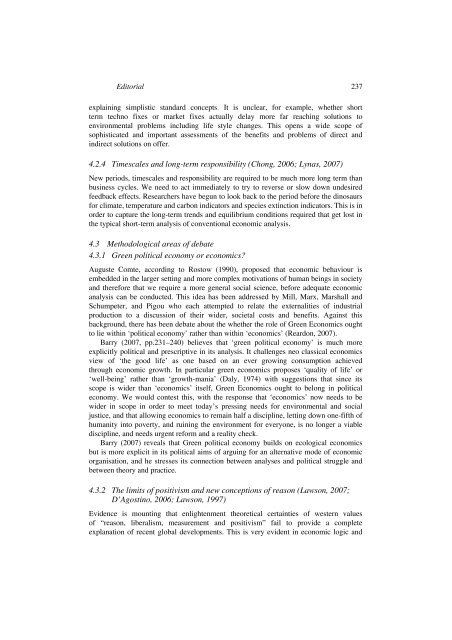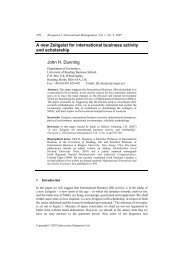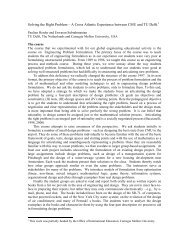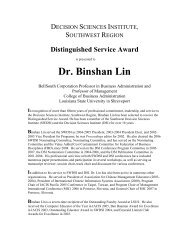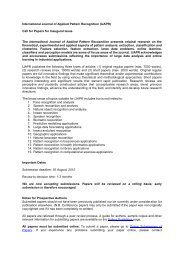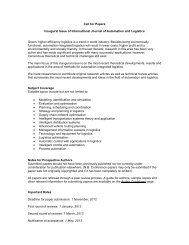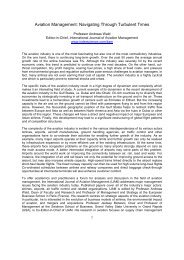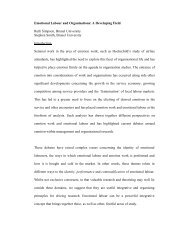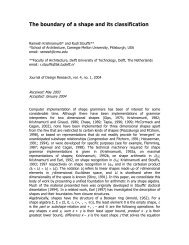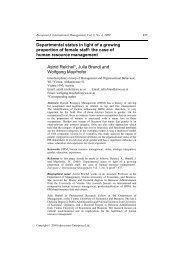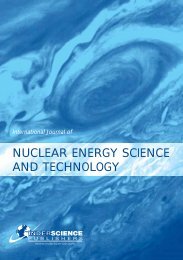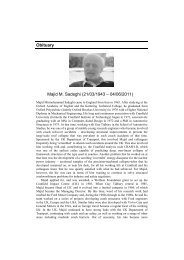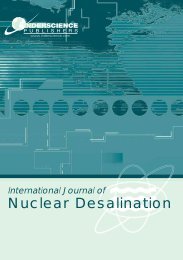Editorial: progress in Green Economics: ontology, concepts and ...
Editorial: progress in Green Economics: ontology, concepts and ...
Editorial: progress in Green Economics: ontology, concepts and ...
Create successful ePaper yourself
Turn your PDF publications into a flip-book with our unique Google optimized e-Paper software.
<strong>Editorial</strong> 237<br />
expla<strong>in</strong><strong>in</strong>g simplistic st<strong>and</strong>ard <strong>concepts</strong>. It is unclear, for example, whether short<br />
term techno fixes or market fixes actually delay more far reach<strong>in</strong>g solutions to<br />
environmental problems <strong>in</strong>clud<strong>in</strong>g life style changes. This opens a wide scope of<br />
sophisticated <strong>and</strong> important assessments of the benefits <strong>and</strong> problems of direct <strong>and</strong><br />
<strong>in</strong>direct solutions on offer.<br />
4.2.4 Timescales <strong>and</strong> long-term responsibility (Chong, 2006; Lynas, 2007)<br />
New periods, timescales <strong>and</strong> responsibility are required to be much more long term than<br />
bus<strong>in</strong>ess cycles. We need to act immediately to try to reverse or slow down undesired<br />
feedback effects. Researchers have begun to look back to the period before the d<strong>in</strong>osaurs<br />
for climate, temperature <strong>and</strong> carbon <strong>in</strong>dicators <strong>and</strong> species ext<strong>in</strong>ction <strong>in</strong>dicators. This is <strong>in</strong><br />
order to capture the long-term trends <strong>and</strong> equilibrium conditions required that get lost <strong>in</strong><br />
the typical short-term analysis of conventional economic analysis.<br />
4.3 Methodological areas of debate<br />
4.3.1 <strong>Green</strong> political economy or economics?<br />
Auguste Comte, accord<strong>in</strong>g to Rostow (1990), proposed that economic behaviour is<br />
embedded <strong>in</strong> the larger sett<strong>in</strong>g <strong>and</strong> more complex motivations of human be<strong>in</strong>gs <strong>in</strong> society<br />
<strong>and</strong> therefore that we require a more general social science, before adequate economic<br />
analysis can be conducted. This idea has been addressed by Mill, Marx, Marshall <strong>and</strong><br />
Schumpeter, <strong>and</strong> Pigou who each attempted to relate the externalities of <strong>in</strong>dustrial<br />
production to a discussion of their wider, societal costs <strong>and</strong> benefits. Aga<strong>in</strong>st this<br />
background, there has been debate about the whether the role of <strong>Green</strong> <strong>Economics</strong> ought<br />
to lie with<strong>in</strong> ‘political economy’ rather than with<strong>in</strong> ‘economics’ (Reardon, 2007).<br />
Barry (2007, pp.231–240) believes that ‘green political economy’ is much more<br />
explicitly political <strong>and</strong> prescriptive <strong>in</strong> its analysis. It challenges neo classical economics<br />
view of ‘the good life’ as one based on an ever grow<strong>in</strong>g consumption achieved<br />
through economic growth. In particular green economics proposes ‘quality of life’ or<br />
‘well-be<strong>in</strong>g’ rather than ‘growth-mania’ (Daly, 1974) with suggestions that s<strong>in</strong>ce its<br />
scope is wider than ‘economics’ itself, <strong>Green</strong> <strong>Economics</strong> ought to belong <strong>in</strong> political<br />
economy. We would contest this, with the response that ‘economics’ now needs to be<br />
wider <strong>in</strong> scope <strong>in</strong> order to meet today’s press<strong>in</strong>g needs for environmental <strong>and</strong> social<br />
justice, <strong>and</strong> that allow<strong>in</strong>g economics to rema<strong>in</strong> half a discipl<strong>in</strong>e, lett<strong>in</strong>g down one-fifth of<br />
humanity <strong>in</strong>to poverty, <strong>and</strong> ru<strong>in</strong><strong>in</strong>g the environment for everyone, is no longer a viable<br />
discipl<strong>in</strong>e, <strong>and</strong> needs urgent reform <strong>and</strong> a reality check.<br />
Barry (2007) reveals that <strong>Green</strong> political economy builds on ecological economics<br />
but is more explicit <strong>in</strong> its political aims of argu<strong>in</strong>g for an alternative mode of economic<br />
organisation, <strong>and</strong> he stresses its connection between analyses <strong>and</strong> political struggle <strong>and</strong><br />
between theory <strong>and</strong> practice.<br />
4.3.2 The limits of positivism <strong>and</strong> new conceptions of reason (Lawson, 2007;<br />
D’Agost<strong>in</strong>o, 2006; Lawson, 1997)<br />
Evidence is mount<strong>in</strong>g that enlightenment theoretical certa<strong>in</strong>ties of western values<br />
of “reason, liberalism, measurement <strong>and</strong> positivism” fail to provide a complete<br />
explanation of recent global developments. This is very evident <strong>in</strong> economic logic <strong>and</strong>


